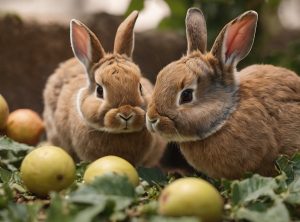Can Rabbits Eat Cluster Figs? Preparation & Quantity Tips, Safety & Nutritional Guide for Fruits
Rabbits are notorious for their love of munching on a variety of foods. As responsible pet owners, we must ensure that the treats we offer are not only delightful but also nutritious and safe. Cluster
The Basic Diet of Rabbits
Before we venture into the world of cluster figs, it’s vital to comprehend a rabbit’s foundational diet.
Nature’s Herbivores:
Rabbits thrive primarily on:
- Hay (especially Timothy Hay)
- Green vegetables
- Fresh water
Cluster Figs: A Nutritional Breakdown
Cluster figs, while lesser-known compared to their counterparts like the common fig, come with their nutritional composition.
Vital Nutrients:
These figs are rich in:
- Dietary fiber
- B-group vitamins
- Essential minerals like calcium and potassium
Dissecting the Cluster Fig Plant
To thoroughly understand the edibility of cluster figs for rabbits, it’s beneficial to break down its various components:
1. The Fruit
This is the juicy and pulpy part most are familiar with.
- Pros:
- High in fiber, which is beneficial for digestion.
- Contains essential vitamins.
- Cons:
- Natural sugars, although not overwhelmingly high, can be an issue if consumed in large quantities.
2. The Leaves
Cluster fig tree
- Pros:
- Can provide variety in a rabbit’s diet.
- Typically safe if sourced from an organic or untreated tree.
- Cons:
- Ensure it’s free from pesticides or chemicals.
3. The Bark and Stems
Not typically considered for consumption, but let’s address it.
- Cons:
- Hard and not digestible.
- Might contain sap which can be an irritant.
4. The Seeds
Found inside the fruit, these are typically small.
- Cons:
- Potential choking hazard.
- No significant nutritional value to rabbits.
Preparation & Quantity Tips
The right preparation can make all the difference. Here’s what you need to know:
- Rinse and Serve: Always clean the fruit thoroughly to remove any residues. If you’re introducing cluster figs for the first time, offer a tiny amount and monitor your rabbit’s reaction.
- Moderation is Key: Remember, fruits should be treats and not a regular part of a rabbit’s diet. Given their sugar content, cluster figs should be given sparingly, maybe once a week.
- No Seeds: To avoid any choking risk, ensure you’ve removed all seeds before serving.
Safety Guidelines
Every fruit, regardless of its benefits, comes with safety considerations:
- Variation: Cluster figs can be a novel treat, but they shouldn’t replace the fundamental components of a rabbit’s diet.
- Freshness: Always ensure the fruit is fresh and not overripe or moldy.
- Organic is Optimal: If possible, source organic cluster figs to avoid pesticide residues.
A Swift Fruit List for Rabbits
For those who are always on the lookout for rabbit-safe fruits, here’s a compact list:
- Apples (without seeds)
- Blueberries
- Strawberries
- Pears (minus the seeds)
- Raspberries
- Blackberries
- Pineapple (sparingly)
In Conclusion: The Verdict on Cluster Figs
So, can rabbits relish cluster figs? The answer is yes, but with caution and knowledge. While the fruit itself, when given occasionally, can be a delightful treat, always monitor your rabbit for any adverse reactions.
Rabbits have a sensitive digestive system, and as caregivers, our primary objective is their health and well-being. By making informed decisions, we can ensure that our furry friends lead a joyous and bouncy life!
Can Rabbits Eat Cluster Figs?
| Feature | Description | Reference |
|---|---|---|
| Nutritional value | Cluster figs are a good source of fiber, potassium, and manganese. | 1 |
| Toxicity | Cluster figs are not toxic to rabbits. | 2 |
| Digestibility | Cluster figs are easily digestible for rabbits. | 2 |
| Quantity | Cluster figs should be given to rabbits in moderation as they are high in sugar. | 2 |
| Benefits | Cluster figs can provide variety in a rabbit’s diet and can be used as a treat. | 2 |








Leave a Reply